“Well, I didn’t see the coins, but from his face I think it was ten cents.”
—The Palm Beach Story
Canada is a country of contradictions. As someone observed, it’s a nation that had the singular opportunity to embrace the very best the world has to offer: French cuisine, British culture, and American technology. Instead, Canada opted for British cuisine, American culture, and French technology.
Feel free to draw your own conclusions.
Personally, I love the Canadian landscape, enjoy the people and, in particular, adore the women, who by and large are the most statuesquely attractive I’ve ever laid eyes on. I think Canadian beer is pretty tasty, too.
But Canadian bureaucracy is like bureaucracy everywhere else. I learned this a few years ago when I was invited, under the aegis of “tourism development,” to visit a camp on Labrador’s Eagle River and write about the experience of fishing for Atlantic salmon there. The deal was that the Canadian government would pay my way to Goose Bay and back, while the lodge would take care of me once I got there.
Well, to make a long story short, the trip had been in the planning stages for months—and 72 hours before I was supposed to be on the ground in Goose Bay I still didn’t have my plane tickets. This despite countless phone calls and faxes (e-mail was in its infancy then) from faceless officials who glibly assured me that everything was “on track.”
For my part, I’d stayed reasonably calm until, with less than three weeks to go before my departure date, I was instructed to submit my resumé—my resumé!—to the Canadian Consulate in Chicago. Instead of catalyzing the desired reaction, it vanished into the same black hole that had apparently swallowed all my previous communiqués. I was beginning to feel like a character in a Kafka story.
So you can imagine my relief when, at the 11th hour, the FedEx van lurched into my driveway. I tore open the envelope, found my airline tickets, glanced at the enclosed itinerary—and nearly went into shock. Instead of flying from the closest major airport, I was going to have to drive three-and-a-half hours to O’Hare—on the 4th of July, no less!—and take the red eye to Toronto. Then, on about four hours’ sleep, I had to catch an early flight to Halifax, where I’d change planes for a scheduled 1:20 p.m. arrival in Goose Bay. Trouble was, according to the information I’d received from the lodge, the float plane—“fixed wing,” as they say in Labrador—was leaving for camp at noon!
I placed a frantic call to my contact in the Newfoundland Department of Tourism. He’d given me no reason to believe he was capable of resolving my problem but I had no place else to turn. “Oh, well, hmmm, I see,” he mumbled as I explained my predicament. Finally, in an anguished tone that made it sound as if I were snatching food from his children’s hungry mouths, he promised that if worse came to worse his office would put me up at a motel in Goose Bay and fly me to camp the following day.
I could live with that, because everyone I’d talked to about the Eagle River described its fishing with barely suppressed awe. In a world becoming increasingly inhospitable to wild Atlantic salmon, the Eagle was, by all accounts, a Last Best Place.
“10-to-20 pound salmon, and lots of them,” was what I’d been told to expect by the owner of a fly shop in Halifax. Needing flies for the trip, I’d put myself in his hands.
“Let’s see,” he said. “You’ll definitely need Pass Lakes…”
“Pass Lakes!” I exclaimed, nearly dropping the phone. The Pass Lake, you see, is a simple wet fly, basically a white calf’s tail wing over a body of peacock herl, that was originally designed by a minister in Clintonville, Wisconsin, just down the road from where I live. It’s a standard Wisconsin trout pattern—but few trout fishermen outside of Wisconsin are familiar with it. To learn that it’s one of the most productive Atlantic salmon flies in Labrador was amazing to me; it seemed the stuff of a PBS special, you know, one of those shows in which they trace the obscure connections that led to some momentous technological breakthrough—how the cotton gin begat the supercomputer, that kind of thing.
It was hard not to view this as a good omen. Although cruelly served by the Pharisees, knowing I had the Pass Lake on my side made me a pillar of faith.
Toronto’s Pearson International Airport is ringed by dozens of high-rise hotels, hotels that collectively offer thousands of rooms. I wouldn’t be staying in any of them. I’d been booked someplace “nearby”—although not nearby enough to have an airport shuttle. My instructions were to call the hotel upon arrival; they would then dispatch a taxi to pick me up. The hotel had a discount fare arrangement with a particular cab company.
An hour after I placed my first call, and half-an-hour after I placed my second, I was still sitting on my duffel bag in front of the taxi stand. I was beginning to get a sense of what it feels like to be homeless. Countless taxis, none bearing the insignia I’d been told to look for, had come and gone. Some of the drivers’ faces were becoming as familiar to me as those of old friends.
Then, just as I was about to say Screw it and hire a cab on my own, the one I’d been waiting for appeared at the end of the queue. I jumped up, flagged it down, and was taken by surprise when the driver emerged. Most Toronto taxi drivers are of Middle Eastern descent, but this guy was a young, thickly muscled, deeply tanned Anglo. He wore a royal blue polo shirt with the collar turned up, khaki cargo shorts, and Vibram-soled hiking boots. And in contrast to the rather taciturn manner I’d observed in his fellow cabbies, he had a positively festive air about him.
“You got Sages in here?” he asked cheerfully as he loaded my rod tube into the trunk.
OK, a taxi driver who fly fishes. Why not? “Scotts,” I said, flopping into the back seat and shutting the door. I wasn’t much in the mood for peppy banter; it had been a long, grinding day, and it was going to be a short, restless night. All I wanted to do was get to the hotel, knock back a couple cold ones, and crawl into bed.
The taxi driver didn’t get the hint. He got behind the wheel, cranked the meter, and asked “Here to fish the Grand?”
“The Grand?”
“It’s a tailwater about an hour from Toronto,” he explained. “It gets tremendous hatches all summer long, and it gives up incredible numbers of 16-to-20 inch browns. A lot of serious anglers will tell you that it’s every bit the fishery that the Bighorn is.”
Who is this guy? I wondered. A shill for the chamber of commerce?
And then it hit me: Oh, crap, he’s a guide.
My instincts proved correct. “I guide part-time out of one of the local fly shops,” he continued as we exited the airport and merged onto a major artery, “but I’m hoping to build up enough of a clientele to make it a full-time gig. I’m not just talking trout, either. I go to B.C. for steelhead and New Brunswick for salmon every year. Wherever the fishing is, that’s where I want to be.”
I wanted to be in my room, channel-surfing my way into Dreamland. “Well, good luck,” I said, struggling mightily to remain pleasant. “I’m on my way to Labrador for salmon, and I have an early flight.
So if it’s all the same to you…”
“You fish salmon, eh? Ever use Spey flies?”
Use Spey flies? I barely knew that when the word “Spey” is used in conjunction with the word “fly,” it has nothing to do with a veterinary procedure.
“Oh, man, you’re missing the boat. Tell you what, I’ll bring you some. You on the 7:00 flight to Halifax?”
“Uh, yeah…” This was starting to get a little weird.
“I’ll meet you at the gate. I’m on duty early anyway. I’ll bring some pictures to show you, too.”
“Uh, yeah, that’d be great…”
At the hotel, after popping the trunk and setting my gear on the curb, he perkily announced that the fare was $45.
“$45!” I yelped. “They told me it would be no more than $20.”
“You’ve got to be kidding,” he laughed. “You can’t even get out of the airport for that.”
I fished the $45 out of my wallet and forked it over. The taxi driver did a studiedly lame job of concealing his disappointment, but damned if I was going to add a tip to his already usurious fare.
“Thanks,” he said glumly. “I guess I’ll see you in the morning.” With that he spun on his heel, climbed into his cab, and sped off into the Toronto night.
I’d just had one of the strangest conversations of my life, but after checking in and discovering to my horror that the hotel bar had closed ten minutes earlier it seemed a dim and distant memory by the time I collapsed into bed. On the brighter side, I’d been pleased to note that the young woman at the front desk displayed the inspiringly buttressed architecture that makes me such an ardent admirer of her tribe.
I slept fitfully, my dreams a confusion of wilderness rivers, leaping salmon, and Amazonian guides in Vibram-soled hiking boots.
I never saw him coming. I was at the gate, with my nose in Richard Ford’s Women With Men (a dreary read, frankly) and my hand around a cup of coffee, when the taxi driver just sort of materialized in the seat to my right. While I hadn’t altogether forgotten about our supposed rendezvous, it wasn’t uppermost in my mind in the murky aftermath of a 4 a.m. wake-up call.
He unslung a small backpack, opened the flap, and produced several clear plastic envelopes with flies in them. “Here you go,” he said, expectantly. Then, lapsing into guide-speak, he added, “On the Miramichi, Speys out-produce hairwing patterns two-to-one. They work when nothing else does. If you move a fish with a traditional fly but it refuses, switch to a Spey. I guarantee you’ll get a strike.”
I pulled out a fly to examine it. It was an elegant looking thing, in a kind of minimalist way, the long, silky plumes bringing to mind the wispy ends of a mandarin’s mustache. It was easy to imagine the undulating action they’d have in the water. I’d seen photos of Spey flies in books (and read about their origins on the Scottish river of the same name), but this was my first encounter with the genuine article. There had to be a dozen in various sizes and configurations, even a few tied low-water style, the bodies foreshortened in relation to the length of the hook. There were black hackled Speys and grey hackled Speys; Speys with purple bodies and Speys with scarlet ones; Speys with silver ribbing, Speys with blue throats, Speys with fluorescent green butts.
“I get the heron feathers from a friend who has a trout hatchery,” he volunteered. “He has a permit to shoot them.” (“That’s what they all say,” a friend who’s knowledgeable about such things later informed me. “Everyone who ties Spey flies has a ‘friend’ who runs a trout hatchery.”)
“They’re beautiful,” I said, genuinely impressed. “I can’t wait to try them.” I rummaged around in my carry-on, found a copy of a small book I’d written, signed it, and gave it to him as a token of my gratitude.
He acted as if I’d just handed him a urine specimen. “Oh,” he said. Not “Thanks,” just “Oh.” Without giving it a second look, he dropped it into his backpack and, in the same motion, withdrew a stack of color prints as thick as a double deck of playing cards. “I wanted to show you these,” he said. (Again, this was in the Dark Ages, i.e., before Smartphones.) He removed the rubber band holding the prints in place and launched into his spiel.
“Here I am on the Grand with a 22-inch brown,” he said, flashing a grinning hero shot. “I was fishing a #18 Baetis Comparadun on 7X tippet.
“That’s me in B.C. with a 17-pound buck steelhead. I was using a two-handed rod and the greased line technique.
“I took this bright 12-pound hen on the Miramichi. No one else in camp landed a salmon that day…”
And so it went on, and on, and on. There was no turning him off, and I was a captive audience anyway. Everything started to blur after a while, and I found myself nodding robotically and saying “Wow” a lot. I thought it was a little strange, though, that the only person who seemed to show up in his photos was him. If he was a guide, shouldn’t there be some photos of his clients?
I was finally saved by the boarding announcement—but not before he’d gotten through the entire stack of prints. I stood up, thanked him again, and extended my hand. Instead of taking it, he reached into his backpack and pulled out a Sage catalogue on which he’d written his name, address, and phone number.
“Give me a call if you’re ever back this way,” he said, pressing the catalogue into my hand. “We’ll fish the Grand.”
He strode off briskly. I tucked the Spey flies into my carry-on, shouldered it, and boarded the plane for Halifax. I was thinking the same thing I’d thought at the very outset of this bizarre transaction: Who is this guy?
It came as no surprise, really, to touch down in Goose Bay more or less on time only to learn that the “fixed wing” was still tied to the dock and the lodge was weathered in. (It’s for reasons such as this that old Labrador hands don’t hold themselves to tight schedules.) There were seven of us in the group, and we cooled our heels in the Labrador Inn, drinking coffee and getting acquainted while we waited for the ceiling to lift over the Mealy Mountains.
In particular, I caught up with my fishing partner for the week, the artist C.D. Clarke. Like most sporting artists I know, Clarke spends a lot of time on salmon rivers. There are few more productive places to angle for clients.
“What did you bring for flies?” Clarke inquired after we’d exchanged the usual pleasantries.
“I can’t really tell you,” I shrugged. “I just told the guy at the fly shop to send me what he thought I’d need. He really touted the Pass Lake, though.”
“The Pass Lake? I’ve never heard of that one.”
“It’s a classic Wisconsin trout pattern,” I said. I extracted my fly boxes from my tackle bag, found the one with the Pass Lakes, and handed it over.
“Not much to it, is there?” he remarked. “But if there’s one thing I’ve learned about salmon fishing, it’s that there’s no substitute for local knowledge.”
Then, nodding approvingly, he inspected the rest of my inventory. “Blue Charms, Rusty Rats, Undertakers, Collingwood Specials…”
“I have these, too,” I interrupted, proffering the envelopes with the Spey flies.
It was as if I’d held out a fistful of diamonds. Clarke’s eyes grew wide, his jaw slackened, and for a long moment he appeared quite literally dumbstruck. Then, taking them from me as gently as if they were rare, exotic moths, he asked “Where on earth did you get the Spey flies?”
“You’re not going to believe this,” I said, shaking my head, “but I got them from a taxi driver in Toronto. He gave them to me, basically. It was sort of a weird deal…”
He stopped just long enough to shoot me an incredulous glance, then resumed slipping the flies from their envelopes, holding them up to the light, and examining them one-by-one. “They’re gorgeous,” he declared. “Do you know how much you’d have to pay for these, assuming you could find someone capable of tying them? They’re just not something you can normally buy.”
I suddenly understood why the taxi driver’s response to my little book had been so chilly: Pegging me as a typical high-rolling salmon fisherman, he figured I’d peel a couple of hundreds from a wad as thick as the Sunday Globe and Mail and fork them over as casually as if I were tipping a bellhop. I saw now that he’d gotten the short end of the deal, but thought perhaps I could redress the situation by throwing a little guide business his way. There was at least one fly fishing friend I could think of who got to Toronto pretty regularly.
And then, while C.D. Clarke ogled the Spey flies and the clouds hung low over the savagely beautiful wilderness that is Labrador, I had a vision of blindingly brilliant clarity, a vision of precisely how the story would unfold. The salmon, capricious as always, would not be in a taking mood. None of the usual Eagle River reliables, not even the vaunted Pass Lake, would trigger a strike. This would go on for several days, the sense of desperation, even futility, intensifying until a pall seemed to settle over the entire camp.
Then, with nothing left to lose, I’d remember the Spey flies. It wouldn’t happen on the first cast—that would be too melodramatic—but on about the tenth drift I’d feel a solid jolt and come fast to a heavy salmon. This scenario would repeat itself in the next pool, on the next beat, and over the days to follow, the Spey flies working when nothing else would, their mojo strong, their karma irresistible.
Being the generous soul that I am, I’d divvy up my Spey fly stash with the other rods—sharing the wealth, so to speak, the Spey flies saving the day for one and all. And, humbly deflecting the credit, I’d insist that we raise our glasses to toast the man who’d tied them.
“What are the odds,” I’d later write, “that the fate of an entire camp would depend on the kindness of a strange taxi driver?”
As a writer, I’m sympathetic to the notion that the absolute truth should never interfere with the telling of a good story. There should always be room for a little poetic license, a bit of artful embellishment.
You have to have something to work with, however, and when the run’s late, and the water’s high, and there’s only a trickle of salmon in the river … You can see where I’m going with this. It was just a tough, tough week, a week of the relentless, even stupefying brand of tedium that is the dark side of Atlantic salmon fishing. There was no magic in the Spey flies; there was nothing miraculous about the Pass Lake. C.D. Clarke managed to pound up a few fish, but he had to spend 18 hours a day on the water to do it.
His example raised an interesting philosophical question. Some would argue that you go to all the trouble and expense of traveling to a place like Labrador precisely because you don’t want to have to rise at 3:30 in the morning in order to catch fish. The other school of thought—the one Clarke espouses—holds that because you have gone to all that trouble and expense, you’d better be prepared to do whatever it takes.
I fall somewhere in the middle on this issue. It boils down, I think, to just how badly you want to catch an Atlantic salmon. In my case, I’m afraid the answer is not badly enough.
“…and the horse you rode in on.”
It was my friend—or maybe former friend—reporting on his visit to Toronto. Hoping to balance the books, I’d turned him on to the taxi driver.
“You owe me big time,” he said. “That guy’s a whack job.”
“Yeah,” I admitted, “he’s a little, uh, different…”
“Different! He starts off telling me he’s not going to charge me, that he just wants to take me fishing. Then he says, ‘If you have a good time, you can give me a tip.’ From that moment on, I don’t think five minutes went by without him mentioning something about the goddamn tip.”
“That seems to be his m.o. Did you catch any fish?”
“Christ. We go to the Grand, right? He’s talking it up like it’s the second coming of the Missouri, and when we get there it’s muddy, it’s low—I felt like I should be sitting in a lawn chair holding a cane pole. ‘Typical midsummer conditions,’ he says.
“Nothing happens for quite a while, but then in the afternoon a few blue-winged olives start to come off. I catch a small brown, ten inches or so, and while I’m playing it I spot a really nice fish rising upstream—I mean a really nice fish. It takes me a minute to get the hook out, release the fish, dry off the fly—you know the drill—and when I look up I can’t believe what I see.”
“Oh, no…”
“Oh, yes: Guide Boy is casting to the riser! He gets a good drift—he throws a nice line, I’ll give him that—and the fish takes. It fights like hell, too, but he finally gets it in the net. Then he has the stones to ask me to tape it for him while he holds it! So I do, and it measures 18½ inches. A real dandy. I’m pretty PO’d at this point, but say ‘Nice fish’ anyway. Do you know what he did then?”
“I have a pretty good idea.”
“The son-of-a-bitch asks me to take his picture! What can I say? He hands me his camera, I take a couple shots. He’s got this big grin that ticks me off even worse than I already am, and after he releases the fish he says, ‘It’s been a great day, hasn’t it?’ I wanted to say ‘Yeah, for one of us.’”
“I take it he didn’t get much of a tip.”
“He got no tip. We’d originally planned to fish the next day, too, but I called him that night and told him I wouldn’t be able to make it—you know, the old ‘something came up’ routine. He wasn’t very happy about that. ‘But I bought cigars for tomorrow,’ he said. ‘Cubans!’ I was half-afraid he was going to start crying.”
“Oh, man, I’m sorry. I really do owe you one.”
“Forget it,” he said, his tone brightening. “The time will come when I’ll be able to laugh about it. And the trip wasn’t a total loss.”
“How’s that?”
“Toronto has more well-built women than anyplace else in the world—and there was a heat wave. I got a sore neck just standing on the street.”
As I said before, Canada has its contradictions, but all in all there’s a lot to like.




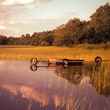
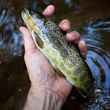
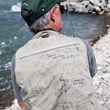
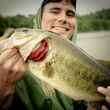
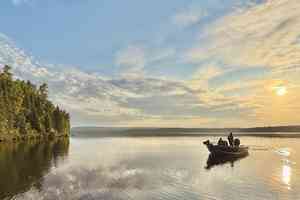


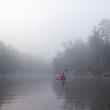

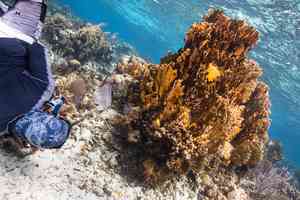






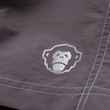
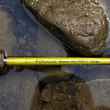
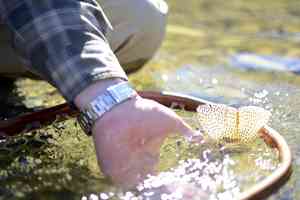
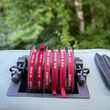

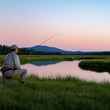
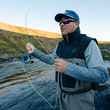


Comments
Keith Weatherly replied on Permalink
Great story and exception writing! First rate.
Pages